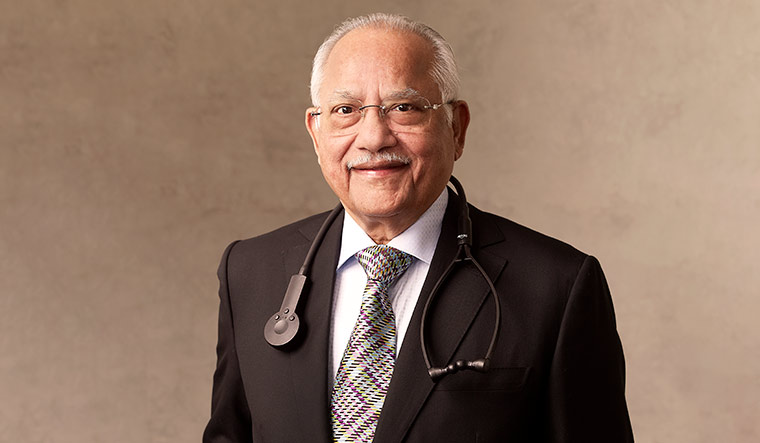Q. Apollo Hospitals has emerged unscathed during the pandemic and also significantly rebounded. What helped you hold up against the tide?
A/ We realised the implications of the pandemic and designed Project Kavach to break the chain through interventions at every stage: detection, testing, isolation and treatment. The goal was to not use hospital beds for people with minimum symptoms. This year, we extended the project to cover vaccination, post-Covid management and also focused on using digital tools for continuity of care of our existing patients, especially those with noncommunicable diseases (NCDs).
We launched Apollo 247 to offer virtual and telephonic consultations with doctors at our hospitals so that patients could access care from their homes and hospitals could focus on in-patients. Post the consultation, the patient could get the prescription and delivery of medicines and schedule collection of samples for any diagnostic lab tests. This was particularly beneficial for expectant mothers, those with chronic diseases and for geriatric care.
We developed a ready reckoner of best practice guidelines, The Red Book, which encapsulates a standard protocol of Covid management. We set up stringent iron curtain infection control protocols to separate Covid and non-Covid patients in the hospital so that the latter do not avoid visiting the hospital for fear of catching an infection.
Once the lockdown started to ease, we encapsulated a get-to-work module and released it as a booklet, Life After Lockdown. We spearheaded continuous medical education programmes centred on Covid prevention and treatment, and continued with our advanced programmes such as MitraClip and robotic surgeries to ensure that all patients were given timely care and intervention.
Q/ How did you make the most of cutting edge technology?
A/ We continued to invest in the best of technology. Our focus is on using digital technology to optimise inpatient and outpatient care and integrate it into traditional hospital services to create a health system without walls. Digital tech at Apollo Hospitals is today an integral part across specialities, including radiology, pathology, oncology, 3D printing and preventive health care.
We launched Apollo ProHealth that uses artificial intelligence and health analytics to predict and prevent health risks through appropriate clinical and lifestyle interventions. From building voice and chat assistants for doctors to optimising the supply chain for our medicine delivery, every step of our care delivery was enhanced with the help of our AI models. Our smart diagnostics software has helped increase the efficiency of our pathologists and radiologists to reduce the time of reporting.
We built a chatbot that helped patients understand their symptoms and the next best action. Patients used Apollo’s cough analyser to detect severity and type of cough so as to have instant analysis at home.
Also read
- Fauci testifies publicly before House panel on Covid origins, controversies
- No pre-departure Covid test for travellers from China, five other countries from Feb 13
- Active cases decline to 7,175: Union Health Ministry
- Active Covid cases reduce to 12,307
- India records 625 new Covid cases, no deaths reported in last 24 hours
- India records 937 new Covid cases, active cases decline to 14,515
Q/ What experiences had an emotional imprint on you?
A/ I recall our pharmacy delivery personnel working day and night during the lockdown in 2020 to deliver medicines to our patients, putting their own lives at risk. Covid was at its peak and vaccinations had not yet started.
In October 2020, Apollo Chennai performed India’s first double lung transplant. During the lockdown in July last year, doctors at our hospital in Bengaluru gave a new lease of life to a 28-year-old man (who had fallen into an oil tank) by performing a highly complicated whole lung lavage to remove oil from his lungs.
A 99-year-old patient, Dr Lakshmi Kanthamma David, who had diabetes, hypertension and an acute kidney injury, was diagnosed with Covid and admitted in the ICU in 2020. She later celebrated her 100th birthday with the staff at Apollo Hospitals, Jubilee Hills.
Q/ What long-term measures should hospitals take to tackle Covid variants and transmissible infections?
A/ With Covid we have learnt that we cannot let our guard down. We need to be constantly vigilant about the changing epidemiology. Today it is Omicron, which itself has three sub-variants now! A few months later it could be another variant. We will need to learn to 'cohabitate' with the virus, to care for Covid and non-Covid patients at the same time by maintaining an iron curtain. This is the new normal in health care. We will have to embrace change with open arms. Adoption of new protocols, newer technology and newer therapeutic and preventive solutions early shall become the norm.
We need to make health care a national priority. We must not forget the massive health care challenge of NCDs and continue to fight that. NCDs lead to six million deaths annually in India. This means six million people would have died from NCDs while were were battling Covid. We need to avert preventable deaths caused by NCDs and strengthen the entire ecosystem, from primary health care to advanced speciality care, with a strong public-private partnership at its base. Alongside, we must build a pool of skilled talent, be it clinical, nursing, paramedical or support staff. We need to double the number of doctors, triple the number of nurses and quadruple the number of paramedics. We need to increase the infrastructure by adding at least 1,00,000 beds in the next five years and strengthen the doctor-patient ratio to prevent the system from getting overwhelmed.


